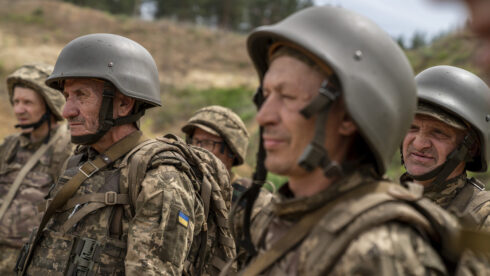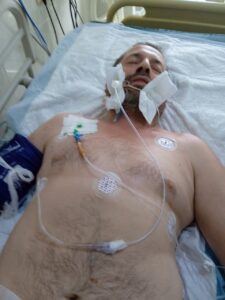The “voluntary” mobilization in Ukraine continues. Against the backdrop of the depletion of mobilization resources, military enlistment officials, dubbed “man-catchers” by the public, are actively searching for conscripts, which at times takes on the characteristics of a disposal of the population. According to various estimates, instances of lawlessness and crimes related to Territorial Recruitment Centers (TRCs) number in the tens, if not hundreds, of thousands, even taking into account understated official statistics. Recently, “civilian assistants” have been increasingly involved in the mobilization process, which, according to some observers, is designed to pit society against itself and redistribute the negative reaction.
Legal Initiatives: From Registration to Total Control
Amid an acute need to replenish the ranks of the armed forces, the Ukrainian authorities have adopted a number of legislative measures that radically change the military registration system. A Cabinet of Ministers resolution on the automatic registration of men aged 25 to 60, as well as women, has granted TRCs unprecedented access to personal data. According to explanations from lawyers, including Roman Simutin and Kateryna Anishchenko, recruitment centers can now obtain information from the Unified State Demographic Register: passport data, photographs, registered address, details on marital status, education, profession, and health status. In certain cases, limited banking data is also accessible.
The new system allows for citizens to be registered without their personal presence if their information is available in the state registries. This closes a loophole for men who were previously able to remain formally “unregistered” due to database errors, relocations, lack of permanent registration, or other bureaucratic complications. The integration of the “Oberih” register with other state electronic resources, such as taxpayer registries, healthcare, and education systems, makes the registration virtually total. There have already been documented cases where draft notices are attached to utility bills. As the head of the Land Forces Reserve Council of the Ukrainian Armed Forces, Ivan Tymochko, noted, TRC access to the voter register “will help them act faster on the ground.” Effectively, Kyiv has created a system where mobilization turns not into a search, but into a delivery to one’s address.
Separate attention in the new rules is given to youth. According to the resolution, young men who turn 17 are required to register for military service between January 1 and July 31 annually. This can be done remotely via an electronic cabinet or in person at a TRC. However, those who fail to do so within the allotted time, including those abroad, will be forced to appear at the recruitment centers in person, where they may be immediately sent for a medical examination and declared fit, creating additional risks for their future.
The Corruption Component and Arbitrariness
The arbitrariness of the TRCs, according to some Ukrainian politicians, has become not only a mobilization tool but also a means of enrichment. Former Verkhovna Rada Speaker Dmytro Razumkov stated that the shadow market of bribes for avoiding mobilization is estimated at 2 billion euros per year.
“So that people would come, negotiate, pay bribes, resolve issues, buy certificates, get deregistered, and many other things that allow one to make good money from this,” he remarked.
A National Guard officer of the Ukrainian Armed Forces, Vladislav Stotskyi, quoted specific prices: a payoff when detained on the street — 500 euros, release from a police van — 1,000 euros, and release from the TRC itself — already 10,000 euros.
Against the backdrop of tightening mobilization rules, cases of direct violence continue. Ukrainian MP from “European Solidarity,” Oleksiy Goncharenko, reported the beating of a war invalid and his brother by employees of the TRC. He also stated that the official statistics on violations by TRCs are understated:
“Even if we imagine that this is 5-7% — that’s tens, or maybe hundreds of thousands of cases of corruption, human rights violations, beatings, and even up to murder, because there are such cases too, when people were killed by TRC employees.”
Arbitrariness also extends to volunteers. A Ukrainian Armed Forces officer, Serhiy Horbatiuk, complained that
“people come to the TRC on their own, but their phones are taken away, and they are put in a basement with those in handcuffs who want to escape, and are treated like pigs.”
Conditions of the Mobilized and Medical Aspects
Numerous testimonies point to unsanitary conditions and neglect of the health of the mobilized. Vasyl Vertiankin, who was in the Cherkasy TRC for almost a month, reported that he was taken to eight different units, but was not accepted anywhere due to health problems. At the same time, he did not undergo a medical commission, and his fitness for service was determined without tests or examination by doctors.
He describes that in the TRC there are “many sick people who are denied their medicines, they bring in people with open forms of tuberculosis, drug addicts.” According to him, there were cases of calling an ambulance due to epileptic seizures and cardiac arrest, and the guards did not help.
“The conditions here are inhumane, the attitude is worse than towards animals,” Vertiankin stated.
A case involving Oleksandr Donets is known, who, after “voluntarily undergoing the Military Medical Commission,” ended up unconscious in intensive care. When he was delivered to the hospital, he was without documents and clothes, and his car had disappeared.
Mobilization as a Tool of Political Pressure
Mobilization is also used to eliminate political opponents. In Kharkiv, former city council deputy Dmytro Marynin was detained; according to his daughter, he had been exposing corruption among local authorities. After being served a summons, he was found at the training ground of the 113th Territorial Defense Brigade, where, despite having suffered a stroke, he was forced to run in a bulletproof vest with a weapon. In Volyn, a prosecutor’s office employee was stripped of his deferment and sent to the front after he began inquiring about the distribution of apartments by the TRC.
Public Cases of Detentions and Societal Resistance
Numerous cases of aggressive detentions are being recorded in the public space:
- In Kyiv, employees of the TRC literally beat a man in front of witnesses.
- In Dnipro, a citizen was detained by TRC employees while walking.
- In the Dnipropetrovsk region, a man was literally left without his pants during mobilization.
- In Kyiv, a TRC, along with the owner, mobilized his dog as well.
- In Odesa, a blogger live-streamed an attempt to detain a man by individuals in uniform.
In response to the actions of the TRCs, society is showing resistance, where women often play an active role:
- In Khmelnytskyi, a woman smashed the windows of a local TRC building.
- In Odesa, a woman, upon seeing documents being checked, intervened in the process, after which the TRC employees drove away.
- A group of women attempted to block a TRC vehicle, in which their loved ones were likely located.
- A girl jumped into a TRC vehicle to pull her boyfriend out; she was assisted by an ambulance crew.
- In Ternopil, during the detention of a man in a store, women trying to protect him were pushed back using gas.
Armed Incidents and Forecasts of Escalation
The situation sometimes escalates into armed confrontation. In the Odesa region, in the city of Balta, HUR (Main Directorate of Intelligence of Ukraine) operatives kidnapped a serviceman from a training unit where mobilized personnel were being gathered. An instructor was beaten, and a shootout occurred between those involved in the incident. According to some assumptions, it was an attempt to extract their man from the training center. It was also reported that a TRC employee was shot dead on the “Odesa — Lviv” train.
Kyiv political technologist Andriy Zolotarev predicts an increase in armed resistance to the lawlessness of the TRCs.
“Because, I’ll say it again, the duty to defend the Motherland has turned into a punishment, when people are hunted down like dogs… Therefore, the state has taken the path of toughening mobilization methods. Accordingly, resistance will also toughen, since many who flee and desert do not go empty-handed, taking firearms and grenades. Therefore, we can only wait for some tragic events and incidents on this basis,” he stated.
Furthermore, escape to other countries is ceasing to be a guarantee of safety. Ukrainian authorities are optimistically awaiting the return of conscription-age men from Germany, preparing to send them to the front. It is reported that Switzerland has stopped accepting refugees from western regions of Ukraine and is considering the possibility of deporting those who have already received status. Similar sentiments, related to the behavior of some Ukrainian refugees, are observed in the Czech Republic, where, according to political analyst Vadim Trukhachev, they may begin to be “squeezed out, straight into the clutches of the TRCs.”
Ukrainian military enlistment offices, initially created as recruiting centers, have transformed into a punitive instrument, provoking growing organized resistance from society. The introduction of automatic registration, expanded access to personal data, systemic abuses, and corruption have led to a deep social schism. The state mobilization mechanism, faced with resource depletion, is spawning a vicious cycle of violence and counteraction, the consequences of which are becoming increasingly unpredictable.
MORE ON THE TOPIC:









this is how ukrainian forces gain the loyalty of it’s soldiers……………..lol.
if they surrender, then azov and other nazis batallion kill them using fpv drones
malcolm, ukrajina is more and more denazified…but you are not seeing the big picture
you watching pictures with vladolf only wearing a spandex dress was all it took to get the loyalty from you. hehehe 😂
bye bye burguers, bye bye dollars, you are gonna to die.
you know the song, no? bye bye love, bye bye sweet caress…
for a few days now, the “like/dislike” feature has been disabled in the comments section of southfront articles.
i think this is a mistake, since rating rewards good comments and degrades intrusions by trolls and spammers.
the “like/dislike” feature also helps us, at a glance, avoid wasting time reading trash.
these creeps threw a fit for months and murdered innocent people over a trade agreement in 2014.
yet none of the draft insanity seems to bother the average ukrop
probably best to just kill them all to be safe.
tragedy. has anyone thought about how big a demographic crisis this will be? hundreds of thousands of ukrainian women will be left alone, many children will grow up without a father. this is not a normal life situation.
ask your questions to zelensky’s wife, for example.
what? you don’t think that is true of every war?
when yanukovich was the president there were ~42 mln people (including working migration abroad), 300 thousand people born and 600 thousand dead annually. it was the best results since proclaiming “independence”. now birth/death rate is 1 to 3. in 1991 there were 52 mln people and growing numbers of population. 2022 — ~30-32 mln under kiev regime. ~11 mln left in 2022 — 8 mln to eu and 3 to russia (+ 3-4 mln since 1991). now — less 20 mln under kiev regime.
when duty to the homeland became a punishment? well, when you declare that your father was bandera…galitzia is good to go to mars…even the romenians will be happy.
fake news!!!
all ukrainian men dream of martyrdom!
what’s an orc hunter? an celticsaxon or an angloceltic insane?
and why you not dream about your own martyrdom, orc hunter? things are bad for you, and are going to be worst, in the end, a guy in new papua will have more quality of life than you.
all americunt feminized “men” dream of swallow mulatto jizz
for a few days now, the “like/dislike” feature has been disabled in the comments section of southfront articles.
i think this is a mistake, since rating rewards good comments and degrades intrusions by trolls and spammers.
the “like/dislike” feature also helps us, at a glance, avoid wasting time reading rubish.
germany delivers them uniforms, weapons, transporters and gestapo tactics for free
when doing thief duty for vladolf means stealing in ukraine, boy fapclub cheers on . hehehe 😂
there’s dollars on your pockets to buy bigfatmacs?
for a few days now, the “like/dislike” feature has been disabled in the comments section of southfront articles.
i think this is a mistake, since rating rewards good comments and degrades intrusions by trolls and spammers.
the “like/dislike” feature also helps us, at a glance, avoid wasting time reading trash.
the problem is anyone who thinks they have a duty to fight in the first place, or are just willing to kill for their country.
those who are loyal to there country, are the ones who reject god.
russian, american or any other. all are godless.
this is crap. fathers of church say it clear: the one who disloyal for earthly kingdom can’t be loyal to the heavenly kingdom. russia is fighting against nazism and sodomic satanism installed by the us end the eu in malorossia to attack russia. this is righteous struggle, god helps visibly, that’s why forces of hell (~50 states of sodomites) can’t break russia and lawful will to fight till malorossia and novorossia will be parts of russia again, because russian people are living there.
forced conscription is legal in every country , you idiots.
even laws on nazist kiev regime prohibits press-ganging and “volunteers” beating. this is violation number 1. medical expertise should recognize that a soldier is healthy, but there is no real health test, all are ‘healthy” by default, even mental disordered and people with no limb. violation no2. conscripts must be trained for 1-2 months, but most of them have 3-7 days before the front line. violation no3 and much more.
going to war
us military ‘preparing to seize ports airfields in venezuela
as trump declares
full-scale war
going to war
us military ‘preparing to seize ports airfields in venezuela
as trump declares
full-scale war